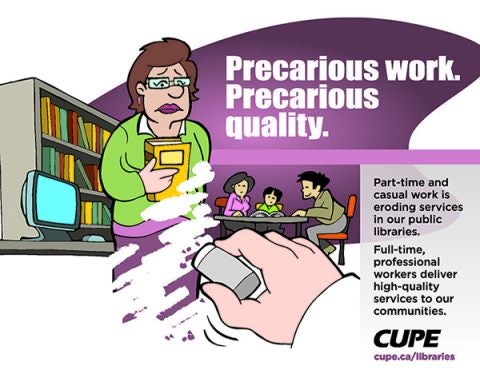
The increasingly precarious nature of work in Canada’s public libraries is hurting the quality of services. A stable, full-time and professional workforce is the best guarantee of quality services for the public. This is the message CUPE brought to the Canadian Library Association (CLA) annual conference, held in Victoria, B.-C., May 28-31.
CUPE hosted a well-attended panel discussion that included Maureen O’Reilly, president of CUPE 4948 (ON); Dawn Lahey, president of CUPE 2329 (NL); and Marlea Clarke, assistant professor at the University of Victoria.
“CUPE has witnessed a decrease in the number of full-time permanent jobs in the library sector, and an increase in the number of part-time, temporary, casual or on-call positions,” said Dawn Lahey during the panel discussion. “Precarious employment in the library sector is slowly eroding the opportunities potential library workers will have for fulfilling full-time employment where they can earn a living wage and have pride in the work they do.”
Marlea Clarke added that precarious work is a lose-lose scenario, both for the workers and for the employers and the public. “Precarity represents a loss of commitment from the employers to the staff, and that has important impacts. Precarity reduces loyalty and moral in the workplace, it makes retention more difficult, it reduces opportunities for training, it produces a loss of skill, it increases stress and health problems, and it ultimately reduces services and quality. Workers have less benefits, lower wages, and worse work-life balance. It is a lose-lose situation.”
Maureen O’Reilly talked about her experience in Toronto public libraries, and presented many facts about the increasing precarious nature of the work. She noted that her members are 75 per cent women, and more than 50 per cent part-time. Many library workers have another job – or two – in order to make ends meet. It usually takes workers close to seven years in precarious work before becoming full-time.
“Our jobs are being more and more de-professionalized,” said O’Reilly. “There is less staff, and it reduces directly the ability to deliver quality services to the public. We must not let library jobs become ‘McJobs’. Right now, library workers are precarious workers, and we work in precarious workplaces. We need to change this. It is ridiculous to think you can have good libraries without good, stable, professional library workers.”

